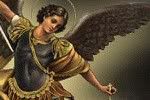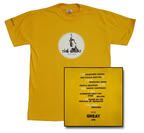Hans Urs von Balthasar Reading Group
I received the following email over the weekend from Adam Janke, my friend and webmaster of Catechetics Online. He is hoping to form an online group to read and discuss Balthasar's great "Trilogy" of theological works on God and man. Here are the details:
Thanks to Nick who also posted this on his blog. (His doing it made me wonder why I didn't!)
We are now forming a group which will read and discuss the "Trilogy" (16 volumes) of the man who has been considered the greatest theologian since Karl Barth and the premier theologian of the 20th century. Since most of us are busy our reading plan will cover either 4 or 5 years. It will be conducted over the Internet on either a dedicated forum just for this purpose or through an email group. If you know anyone that might be interested in this reading group, please pass the word along and have them email me. We are hoping to get together at least 10 people who are interested in the reading group, and at least a couple of people who are familiar with Balthasar's thought and can help guide us. We want to start sometime in the next month.Adam also provided the following short bio on Balthasar:
For more information on what we will be reading, I have included a summary of each book:
Part I: The Glory of the Lord: A Theological Aesthetics
Probably the most important sustained piece of theological writing to appear since Karl Barth's Church Dogmatics, von Balthasar's work restores aesthetics and contemplation to their rightful place in Christian theology. Armed with a remarkable knowledge of the theological and metaphysical traditions as well as of Western letters, von Balthasar shows how the Biblical vision of the divine glory, revealed in the crucified and risen Christ and reflected in the great theologies of the Christian tradition, fulfills and transcends the perception of Being in Western Metaphysics.Volume I - Seeing The Form
The work opens with a critical review of developments in Protestant and Catholic Theology since the Reformation which have led to the steady neglect of aesthetics in Christian theology. From here, von Balthasar turns to the central theme of the volume: the question of theological knowledge. He re-examines the nature of Christian believing (here he draws widely on such theological figures as Anselm, Pascal, and Newman) which gives due place to the particular kind of 'knowing' which develops within the personal relationship of the believer to the God mediated through the revelation-form of Jesus Christ.
Volume II - Clerical Styles
What von Balthasar offers here is a typology of the relationship between beauty and revelation which shows that there neither has been nor could be any truly great and historically fruitful theology which was not expressly conceived and born under the constellation of beauty and grace. This volume specifically offers a series of studies of representative figures from the earlier period of Christian theology - Irenaeus, Augustine, Denys, Anselm and Bonaventure.
Volume III - Lay Styles
This volume specifically offers a series of representative figures from the later period of Christian theology - Dante, John of the Cross, Pascal, Hamann, Soloviev, Hopkins and Peguy.
Volume IV - The Realm of Metaphysics in Antiquity
This fourth volume considers the metaphysical tradition of the contemplation of Being. He provides major studies of Homer, the Greek Tragedians, Plato and Plotinus and the development of this tradition in the Middle Ages. He then explores the analogy between the metaphysical vision of Being and the Christian vision of the divine glory of the Trinity.
Volume V - The Realm of Metaphysics in the Modern Age
This volume presents a series of studies of representative mystics, theologians, philosophers and poets and explores the three main streams of metaphysics which have developed since the catastrophe of Nominalism. the way of self-abandonment to the divine glory is traced through figures like Ekhart, Julian of Norwich, Ignatius, de Sales; the attempt to relocate theology and beauty through figures like Nicholas of Cusa, Holderlin, Goethe, Heidegger; the metaphysics of spirit through Descartes, Leibniz, Spinoza, and the Idealists. The strengths and weaknesses of these ways are relentlessly exposed. This volume ends with the search for the Christian contribution to metaphysics.
Volume VI - Theology: The Old Covenant
This volume initiates von Balthasar's study of the biblical vision and understanding of God's glory. Starting with the theophanies of the Patriarchal period, it shows how such glory is most fully expressed in the graciousness of the Covenant relationship between God and Israel. But the breaking of that relationship by Israel means that in the later books of the Old testament, the divine glory is seen in God's willingness to bear with his people in the dark side of their history. There is no final version of God's glory in the Old Testament. In the 500 years before Christ the Covenant relation is more idea than reality. The vision of the transcendent glory of God which is developed in the later writings, is only fragmentary. It will find its strange and unexpected fulfillment in the new Covenant.
Volume VII - Theology: The New Covenant
In this final volume of part one, von Balthasar reflects on the New Testament vision of God's revelation of his glory in Christ. This divine 'appearing' is grounded in the self-emptying of the eternal logos in the incarnation, cross and descent into hell. Christ is the man who represents God and is also God; he is a symbol of the world and is also the world. He dies, but in dying rises into the eternal life of God. It is in Christ's incarnation and resurrection that the Christian vision is truly expressed and the joining of God and the world in the new and eternal covenant is realized.
Part II: Theo-Drama: Theological Dramatic Theory
Here it is "the good" which provides the key. Here being as splendid, to be contemplated (beauty) now appears as the goal of our striving (the good). Von Balthasar maintains that it is in the theatre that "man attempts a kind of transcendence endeavoring both to observe and to judge his own truth, in virtue of a transformation...by which he tries to gain clarity about himself". Von Balthasar sees the phenomenon of theatre, the sheer fact that there is such a thing as structured performance, as a virtually untapped source of fruitfulness for theological reflection. His aim will be "to show how theology underlies it all, how all the elements of the drama can be rendered fruitful for theology."Volume I - Prolegomena
In this volume von Balthasar shows how many of the trends of modern theology point to an understanding of human and cosmic reality as divine drama. He will then consider objections to such theological dramatic theory and also the relationship between the Church and the theatre. This volume assembles the materials and the themes that will make it possible in subsequent volumes to develop this theological dramatic theory.
Volume II - Dramatis Personae: Man in God
Where the first volume surveyed the great world dramatists to gather concepts and ideas to apply to the real stage, which is the universe God has made and entered into himself as an actor. This volume describes the actors, the dramatis personae. This is his theological anthropology concerning man, his freedom and destiny in light of the biblical revelation. Von Balthasar is concerned here with the dramatic character of existence as a whole, approaching the topic through a consideration of the various conditions and situations of mankind as a drama that involves both the Creator and his creatures.
Volume III - Dramatis Personae: Persons in Christ
This is considered the most central book of the entire trilogy. It contains von Balthasar's synthetic treatment of the central mysteries of the Catholic Faith: Christ, Mary, the Church, man and the Trinity.
Volume IV - The Action
Von Balthasar now turns to the action of the divine drama itself. Here we find his soteriology, where time, freedom, history, power, sin, conflict are seen in the light of the Cross, the culmination of the action and passion of God and man.
"Here we discern the unity of 'glory' and the 'dramatic'. God's glory, as it appears in the world- supremely in Christ- is not something static that could be observed by a neutral investigator. It manifests itself only through the personal involvement whereby God himself comes forth to do battle and is both victor and vanquished. If this glory is to come within our range at all, an analogous initiative is called for on our part. Revelation is a battlefield. Those who do battle on it can only be believers and theologians, provided they have equipped themselves with the whole armor of God."
Volume V - The Last Act
This volume is trinitarian, focusing on the mystery of God. He draws heavily on scripture and many passages from the works of the mystic Adrienne von Spyer. Some of the topics covered include "A Christian Eschatology", "The World is from the Trinity", "Earth Moves Heavenward", "The Final Act: A Trinitarian Drama."
Part III: Theo-Logic
Theo-logic is the crowning part of the great trilogy of the masterwork of von Balthasar. Theo-logic is a variation in theology, is being about not so much what man says about God, but what God speaks about himself. Balthasar does not address the truth about God until he first reflects on the beauty of God (The Glory of the Lord). Then he follows with his reflections on the great drama of our salvation and the goodness and mercy of the God who saves us (Theo-Drama). Now, in this work, he is ready to reflect on the truth that God reveals about himself, which is not something abstract or theoretical, but rather concrete and mysterious richness of God's being as a personal and loving God.Volume I - The Truth of the World
Explored in this volume are the topics:
--Truth as Nature
--Truth as Freedom
--Truth as Mystery
--Truth as Participation
Volume II - The Truth of God
--Topics include:
--Divine and Human Logic
--The Possibility of Christology
--Logos and Logic in God
--Kata-logical Aspects
--The Word Was Made Flesh
Volume III - The Spirit of Truth
Topics Include:
--The Holy Spirit as Person
--The Father's Two Hands
--The Role of the Spirit in the Work of Salvation
--The Spirit and the Church
--Spirit and World
--Upward and Onward to the Father!
Epilogue
A summary of the whole series divided into the following aptly named sections: Forecourt, Threshold, and Cathedral.
About Hans Urs von BalthasarIf you are interested in joining this group, email Adam at: adam4jmj [at] gmail [dot] com
Born in Lucerne in 1905, after studying at the universities of Vienna, Berlin and Zurich von Balthasar completed a Ph.d. at Zurich in 1929 and continued his theological and philosophical studies in Munich, Lyon and Basel. He has won several academic prizes and has been awarded honorary doctorates at Edinburgh, Munster and Fribourg universities and the Catholic University of America. A Corresponding Fellow of the British Academy, he was also a Foreign Associate of the Institut de France. He died in July, 1988.
Thanks to Nick who also posted this on his blog. (His doing it made me wonder why I didn't!)
Labels: Books













2 Comments:
your welcome ;)
Laura, Thanks a million for the info on adding links to my blog! I needed that bit of info for so long. You rock!
Post a Comment
<< Home